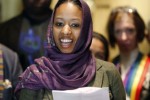Early this month Amparo Sánchez Rosell (President of the Islamic Cultural Centre in Valencia) met with the Special Commission on the Study of Gender Violence of Les Corts Valencianes. As reported by ABC Agencias and WebIslam, Sánchez asked the commission to eradicate the idea that Islam consents or encourages gender violence, which she believes is not true.
Although for many Muslim women this may be a common-sense approach, this claim may rise more than few eyebrows. While some people in the West, such as Geert Wilders, believe that Muslims are violent and that their practices are incompatible with Western life styles, few Muslims defend domestic violence. What is more problematic, domestic and sexual violence are sometimes equated with “Islamic cultural practices” and defended as such in secular contexts.
In a time when European governments feel strongly threatened by Muslim populations and actively respond to this by banning niqab and hijab or questioning whether they should allow immigrants to stay, Sánchez’s call for the eradication of a misunderstood Islam may not be in accord with the political environment. Islamic doctrines are put under the microscope and used as a political discourse in many European countries where no other religion has been analyzed in this way, even when other doctrines may not be gender friendly.
Fears of “Islamization” have resulted in the wide spread of radical right-wing parties and politicians in Europe, who blame many of their problems on Muslim immigrants as Ilgar Ibrahimoglu explains.
Whether Islam condones gender violence or not is a matter of debate. However, Sánchez and others have pointed out that gender violence exists and it is practiced in a wide range of societies and contexts where a very strong “macho” culture exists, even if Islam is not present. Unfortunately, many countries around the world fall under this category.
Although we cannot deny that many Muslim women suffer abuse, this is not unique of Islamic societies and violence transcends religious background. The UN statistics of violence against women show that women from a wide range of societies have been abused at some point in their life. Among the included countries we find Ethiopia, Brazil, Germany, England, Bangladesh, etc., which represent a broad range of religious traditions. In the case of Spain, The Women´s Institute reports that, 53 women have been murdered by partners or ex-partners in 2010. Ten of them were Latin American, 32 were Spanish, five of them African and the rest were from different European backgrounds.
Sánchez also mentions that, at least in Spain, Muslim women who face abuse are particularly vulnerable because of their condition as immigrants. Spain’s Muslim population is predominately made up of immigrants, and many of these women have no access to government agencies to report abuse or they don’t speak the language. These women not only have a hard time at home but also feel marginalized in public because the media and other sources say their religion is the problem.
The image of weak Muslim women who have little or no agency prevails. Moreover, Islam is blamed for everything bad men do and everything bad that happens to Muslim women. This discourse is also promoted by many political actors under the liberation banner. However, as Sánchez explains, undermining women’s faith by telling them that religion is the source of all their problems neither helps women, nor does it explain why gender violence exist in secular contexts.
European countries have decried a lot about the condition of Muslim women, but have done little of substance to help. Some European governments have focused only on restricting women’s right to dress the way they want which, according to Herman Salton is not different than forcing women to wear hijab. Moreover, all the energies have been used to scrutinize the Qur’an whereas providing little credit to Muslim women’s movements.
Neither governments nor the media are interested in knowing what Muslim women think about topics such as the hijab or gender violence. The work of Muslim women is neglected and undermined in an environment were politicians rely on the “weakness” of Muslim women to create discourses and acquire some popularity.
Gender violence exists, and as Sánchez affirms, it happens in Muslim communities. Yet, this fact is used as a political discourse, which does not necessarily help Muslim women. If European governments are concerned about the inequality and mistreatment of Muslim women (who are not all immigrants), they should create support networks and accessible organizations that respect women’s faith and provide help. Such organizations exist, although they are non-governmental in most instances.
Both men and women from all backgrounds should be protected against violence, in all contexts, all cultures and religions. Politics is not the place to discuss Islam’s oppressiveness–that’s the job of the believer. Politics is the place to create public policy that grants and enlarges civil liberties, not that reduces them to a discussion on clothing.
Unfortunately, Muslim women in Europe may face challenges from both sides of the coin. On one hand, it is true that many Muslim women do not enjoy gender equality in Europe; on the other, European states are perpetrating this pattern by not letting Muslim women express their opinion and make their own choices. Instead of providing a safe space, they are creating a hostile environment for Muslim women. What option is left for Muslim women who are oppressed within their communities when the state oppresses them further?

